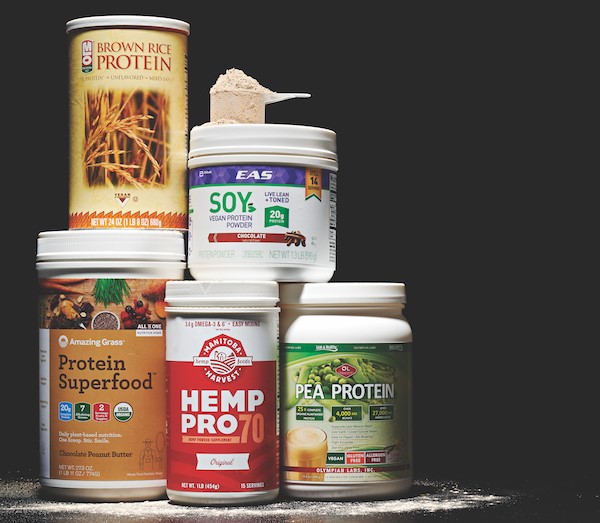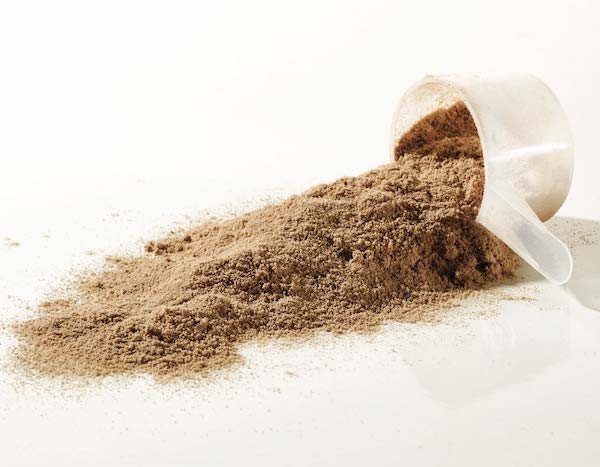Description
Whey protein may be the most popular, but is it really the best one for you? Here we explore the differences in seven types of protein powder to help you decide what's best for you.
Keep in mind: The Daily Value for protein is 50 grams a day based on a 2,000-calorie diet, but some people work to get .6 to .8 grams per pound of body weight. Your Hy-Vee registered dietitian can help you determine an appropriate amount of protein for your goals.
Whey Concentrate
Whey protein, a byproduct of milk, is perhaps the most popular type of protein supplement on shelves. Whey enters your blood stream faster than any other protein and boasts the highest level of the amino acid leucine, which is good for providing muscles with the necessary fuel to power through a workout and build muscle. It's considered the most effective powder for building muscle; so if that's the goal, aim to consume it within an hour after exercise.
Whey concentrate is a form of whey protein that includes some lactose and fat. It's about 78 to 88 percent protein and is often more flavorful and less expensive that whey isolate.
Whey Isolate
Whey isolate means that carbs and fat have been removed to yield a powder that's 98 percent protein.
Casein Protein
Casein, like whey, is a protein found in milk. The biggest difference is that casein takes longer to digest, which is why some athletes choose to take it before bed. Whey protein, on the other hand, absorbs quicker, which is why it's often taken immediately after a workout.
Soy Protein

Soy protein is made from ground soybeans (no surprise there) that have been dehulled and defatted. It digests at a moderate rate, like egg white protein, and contains greater amounts of the amino acids glutamine and arginine, which may help support immune function, digestive health, and brain function. It's a complete protein and considered the most effective plant-derived source for building or maintaining muscle, but the verdict is still out on its potential health risks for women with a history of estrogen-related cancers and men with lower testosterone levels. If you fall into either camp, you may want to steer clear, or at least vary your protein sources.
Egg White Protein
Egg white protein is just what it sounds like: Dried whites that have been turned into a powder. This protein digests slower than whey but faster than casein. Although not quite as good as whey or casein in terms of muscle protein synthesis, it's still a good option in a post-workout or meal-replacement smoothie. It's also a good option for anyone who is allergic to or avoids dairy (since whey protein and casein protein are derived from milk).
Pea Protein
Pea protein, derived from the yellow pea, is the most highly digestible of the plant proteins, making it a good alternative for anyone with a sensitive stomach who doesn't want to do dairy or soy. But it's not a complete protein—it's low in 2 amino acids—so pair it with another plant-based protein such as hemp or rice to round out its amino acid profile and make it "complete."
If you want higher protein content, choose a "pea protein isolate." The slightly lower-protein "pea protein powder" is also a good choice, and readily available in organic varieties.
Hyvee Dietitian Expert Tip
One way to assess protein quality and bioavailability is the Protein Digestibility Corrected Amino Acid Score (PDCAAS). It ranks proteins from zero to 1; the closer to 1, the better. Whey, Casein, Egg White Powder, and Soy are all 1; whereas hemp is 0.46 and pea protein is 0.69.Hemp Protein
Hemp protein is made from nutrient-packed hemp seeds, and while it's not the best for boosting muscle because of its lower protein content (most contain just 10 to 15 grams per scoop, depending on the brand, compared to about 25 grams in whey and 22 grams in soy) and PDCAA score, it does provide a good dose of fiber and omega-3 fatty acids. Pair it with rice or pea protein to round out its amino-acid profile and make it complete. This is a good choice if you want to ramp up your overall nutrient intake and don't have strong protein needs.


